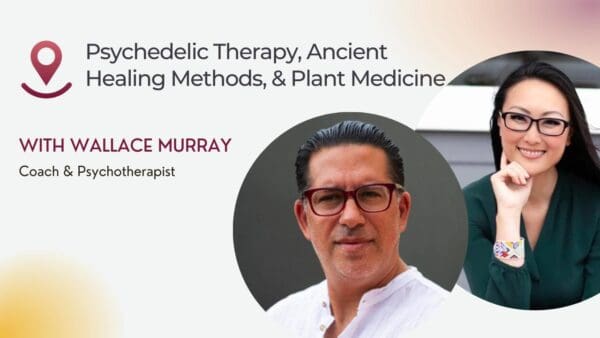In this interview, we have the privilege of speaking with Gina Devani, a facilitator of deep healing with psychedelic medicines. Gina is a board-certified holistic counselor and transformational psychedelic integration coach, working with individuals to prepare for, move through, and integrate their psychedelic journey work. She sheds light on her therapeutic approach, the significance of grounding parts, and the vital role of integration in the healing process.
Psychable: Can you share a little about yourself and your journey to working with psychedelic integration?
Gina Devani: My healing journey began over 20 years ago when I struggled with depression and lacked understanding about how to help myself. However, after experiencing some health crises, I decided to take charge and embark on a deep healing journey. Childhood trauma was the main focus of my healing work, and I gained the skills necessary to work on my own issues. Eventually, I felt ready to help others, and this led me to become a facilitator and guide for deep healing work using primarily plant medicine, like psychedelics.
Can you provide an overview of your therapeutic approach and how it aligns with psychedelic integration?
My therapeutic approach centers around Internal Family Systems (IFS) or parts work. We all have different aspects of ourselves that hold various beliefs and strategies to manage stress and stay safe in life. These aspects operate below our conscious awareness but greatly influence our behavior. Trauma often involves these parts, which store memories and coping mechanisms from challenges without being overwhelmed.
How do you address relationship challenges and insecurities that stem from childhood trauma in your therapeutic approach?
Childhood trauma can manifest in adult relationships, leading to self-sabotage and fear of trusting others. The protective parts developed during childhood are often responsible for maintaining these patterns. Integrative work involves identifying these parts, understanding their role, and providing space for healing. Additionally, developing healthy communication skills, such as Nonviolent Communication (NVC), can support individuals in building healthy relationships.
How do you approach psychedelic integration for individuals who may not feel ready to work on their traumas?
Not everyone may be ready for deep work initially, and that’s okay. Different facilitators and containers cater to different needs. For those not ready for deeper exploration, group work may provide a safe space for initial introspection and surface-level healing. One-on-one work with a skilled facilitator can be more effective for individuals prepared to delve deeper into their subconscious and work on their traumas.
How does spiritual bypassing affect psychedelic integration, and how do you address it in your work?
Spiritual bypassing can be a defense mechanism to avoid confronting deep-seated issues. Psychedelics can sometimes be misleading and may lead individuals to believe they’ve achieved profound enlightenment, when in reality, they have only scratched the surface. My approach involves gently guiding individuals to explore and challenge their experiences, helping them navigate through confusion and ultimately discover the deeper truths within themselves.
Can you tell us more about your work with couples and how you approach integration in their relationship?
Couples work involves individual exploration before joint sessions. Each partner gains awareness of their subconscious patterns and how they influence the relationship. Understanding what brought them together and the needs each partner fulfills is essential. Group work with couples focuses on collective healing, addressing relational fields, and higher levels of energetic transformation. The process can be profound and lead to a deeper connection and mutual growth.
How did you get involved in psychedelic integration work, and what led you to pursue this path?
My journey into psychedelic integration work began with my own personal healing and exploration using psychedelics. As I delved into this realm, I found it immensely transformative and saw the potential for profound healing. Eventually, my passion for supporting others on their healing journeys led me to pursue formal training and certifications to become a psychedelic integration therapist.
Can you explain the concept of "psychedelic integration" and its significance in the healing process?
Psychedelic integration refers to the process of making sense of and incorporating insights and experiences gained during psychedelic journeys into everyday life. The integration phase is essential because it allows individuals to process and understand their visions, emotions, and learnings on a deeper level. By integrating these experiences, individuals can apply the newfound awareness to their daily lives, promoting healing and growth.
What does a typical psychedelic integration session with you entail, and how do you create a safe and supportive environment for your clients?
A psychedelic integration session with me involves creating a safe and sacred container for clients to explore their inner worlds. I prioritize psychological safety and healing throughout the process, making sure clients feel secure and supported. We delve into their experiences, emotions, and visions, helping them gain insights and understanding. Trust is essential in this work, so I emphasize the importance of establishing trust between the client and myself.
How do you help individuals navigate the challenges that may arise during psychedelic integration?
Navigating challenges during psychedelic integration involves a gentle and compassionate approach. I assist individuals in identifying and understanding the protective parts that might surface during the process. By acknowledging and working with these protectors, clients can access deeper levels of healing and understanding. I emphasize the importance of going slow and addressing any traumas or unresolved issues that arise in a careful and trauma-informed manner.
How do you handle the preparation phase before a psychedelic journey, and how do you help individuals set appropriate intentions for their experiences?
The preparation phase is crucial and involves understanding the individual’s healing goals, intentions, and expectations for the journey. I work with clients to identify their needs and guide them in setting meaningful intentions. It’s essential to create a safe and supportive environment for clients to explore their intentions and gain insights into their healing process.
Can you elaborate on the process of integration and how clients can apply their psychedelic experiences to their daily lives?
Integration is the key to making lasting changes from psychedelic experiences. After a journey, we work together to process and interpret the insights gained. By applying these learnings to daily life, clients can create profound transformations and healing. I provide ongoing support and guidance during the integration process to help clients maintain their newfound awareness and healing.
How do you address the challenges that may arise for couples seeking psychedelic integration together?
Working with couples in psychedelic integration involves a thorough exploration of their relationship dynamics, communication styles, and individual healing journeys. I prioritize creating a safe space for both partners to share and support each other’s healing. It’s important to work through relational challenges and support each partner’s healing journey, fostering growth and understanding in the relationship.
Gina Devani’s work in psychedelic integration provides a unique and transformative approach to healing. By creating safe and sacred spaces for individuals and couples, she guides clients through profound journeys of self-discovery and growth. With her emphasis on trust, compassion, and trauma-informed care, Gina facilitates integration, helping clients apply their psychedelic experiences to their everyday lives, ultimately promoting healing and personal transformation.
As a Psychedelic Integration Coach, Gina is available to support clients in both Oakland, California, and Santa Fe, New Mexico.









